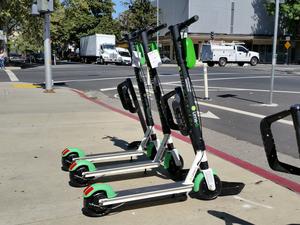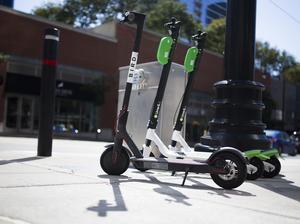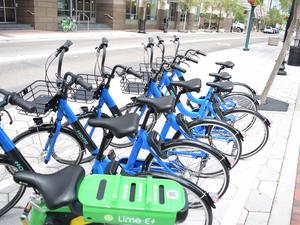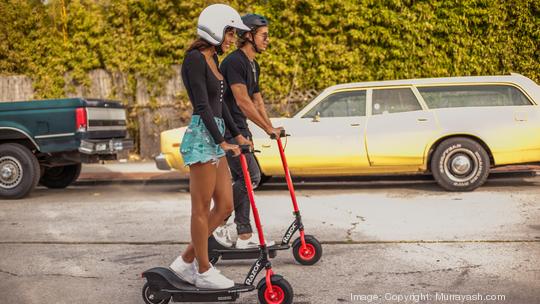
The city of St. Petersburg is slated to approve agreements with two e-scooter vendors after making alterations due to Covid-19.
On Aug. 20, the city is scheduled to potentially execute agreements for the shared e-scooter pilot project with California-based Razor USA LLC and Chicago-based VeoRide Inc.
The city first garnered interest in 2018 and initially issued a request for proposals in December 2019 to solicit vendors that could link and support first-mile-last-mile transit systems via e-scooter and introduce the new transit mode.
However, the Covid-19 pandemic has pushed the time line by two to three months in the e-scooters deployment, St. Pete Transportation and Parking Management Director Evan Mory said.
The draft agreement was refined in the spring; staff required the companies to give the city their plans to address ceasing the spread of Covid-19. The vendors listed steps such as enhanced cleaning for scooters and employees wearing masks, Mory said.
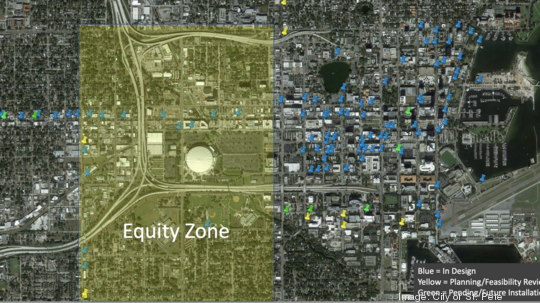
In June and July, the city negotiated with the top three ranked operators. Two of the top-ranked operators, Bird and Spin, ultimately indicated that due to a changed market environment, they would not be able to enter agreements with the city. Negotiation with the fourth-ranked operator began and was successful, according to city documents.
In total, there were eight initial companies vying to be part of the 18-month program: Bird Rides Inc., Boost Technologies, Lime, Razor, Slidr, Spin, VeoRide and Wheels Labs Inc.
More on the e-scooters slated for approval:
Razor
- In 14 cities including Orlando
- Swappable batteries
- Has a seat option
- $1 to unlock scooters; $0.28 per minute
- Scooters have front baskets that can hold up to 50 pounds
- 16-inch tires
VeoRide
- In 16 U.S. cities including Tallahassee
- $1 to unlock; $0.33 per minute
- 10-inch tires
- Has under deck lighting for visibility
The companies that were ultimately not selected mainly failed to have enough materials to present to the board, have been pulled out of cities, or refused to disclose financials, city documents stated.
VeoRide and Razor representatives will virtually attend the upcoming meeting, Mory said. If the agreements are approved, the scooters would be deployed in late September or early October.
The scooters would mainly be deployed in the core downtown area. The area includes the Edge district, Grand Central, Deuces Live on 22nd Street South and the MLK Street Business District with roughly 100 corrals for parking. The corrals would be identified by paint and posts.
There is a one-time fee of $40,000 for each vendor to provide the city with funding to establish the parking corrals. There is already a corral placed at the new St. Pete Pier District, Mory said.
Riders are only permitted to drive the scooters in the streets and can only go to certain areas in the Pier District, but cannot go to the actual pier or marketplace.
The total number of scooters deployed will eventually be between 600 and 1,500, or roughly 750 scooters per operator.
There are certain restrictions for the scooters:
- Scooters can only be operated by those who are at least 18 years old
- They can only travel up to 15 miles per hour
- Must be GPS-equipped scooters
- Can only operate between 6 a.m. and 10 p.m.
- Although the program is originally for 18 months, the city is able to extend it.
The city is also in charge of the scooter parking areas, can cite violations for improperly parked scooters and can suspend scooter operations.
Cities such as Tampa have faced criticism from pilot launches due to riders poorly parking scooters and riding in restricted areas.
“Early on we had public workshops. The public has two main concerns — clutter and safety,” Mory said. “We have done a lot of research ... we took a slow approach.”
For each nuisance scooter, the operator would pay the city $50 per occurrence and an additional $50 for each consecutive two-hour periods thereafter in which the scooter remains uncorrected, according to city documents.
The city will also solicit assistance of a university-based research center to evaluate the program’s performance and make recommendations on how to improve the program.
